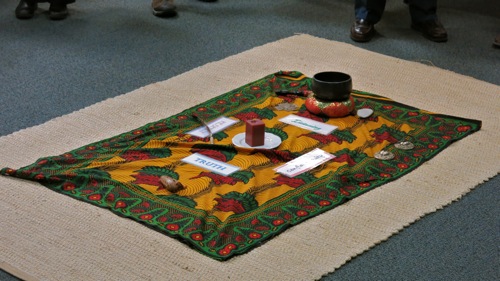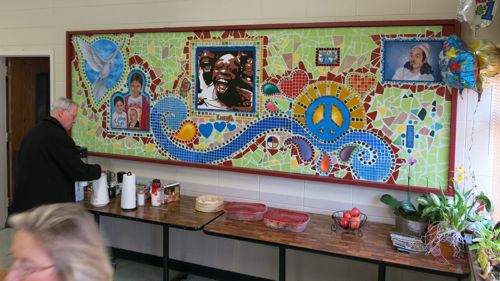The second plenary sessions at the Religious Education Association 2014 conference was devoted to field trips to various locations in Chicago that are working for nonviolence. One field trip was to the a href=”http://www.swopchicago.org/home.aspx”>Southwest Organizing Project (SWOP); a second trip went to the John Marshall Law School Restorative Justice Project. I chose to go to Precious Blood Ministry of Reconciliation (PBMR) in the Back of the Yards neighborhood of Chicago.
At PRMR, we met with Father David Kelly, a Catholic priest affiliated with the Precious Blood missionaries, and three young men who participated in PBMR programs. Father Kelly said that he had been involved with various prison and inner city ministries before helping to organize PBMR. In his experience, he had found that the criminal justice system is primarily adversarial in nature, and that it does not provide any real support to either perpetrators nor victims. And at times he found himself in situations where he had a relationship with both the victim and the perpetrator of a crime — how could he minister effectively to both?
Thus he became increasingly committed to a ministry of reconciliation. The mission statement of PBMR says, in part: “Our ministries reach out to the victim, the wrongdoer, and the community to create a safe space where healing can begin and where people can find the support and encouragement needed to begin reconciliation.” PBMR uses a number of techniques to this end, and Fr. Kelly told us about some of them, including peacemaking and reconciliation circles, where victims and perpetrators who wish to do so can meet face-to-face in a safe and supportive environment.
Fr. Kelly also spoke about his “ministry of accompaniment,” which he contrasted to a “ministry of referral.” In a ministry of referral, if someone came to him with a problem, he would simply refer that person to a source of assistance. In a ministry of accompaniment, he would physically accompany that person to the place where they could get assistance. As an example of what he meant, he asked permission of one of the young men who was present to tell his story. This young man had recently gotten out of the juvenile justice system, and was having difficulty getting back into school (although public schools are legally required to admit released offenders, schools often place obstacles in their way). So Fr. Kelly accompanied this young man to a meeting with a school administrator to make sure he could get back into school.
Fr. Kelly spoke of the “school to prison pipeline.” Many public schools in Chicago have police officers on site, and misbehaving students can be arrested and moved directly into the juvenile justice system. Young people who enter the juvenile justice system are more likely to enter the criminal justice system as adults; and they often find it difficult to re-enter the schools once out of the juvenile justice system. Fr. Kelly said PBMR is trying to keep this from happening.
At Fr. Kelly’s urging, the young men spoke of life in their neighborhood. Although they liked living in their neighborhood, they felt it was necessary for them to join a gang in order to stay safe. Compared to the stories they have heard from older people in their neighborhood, the gangs are more chaotic and more violent than they were twenty years ago. It became obvious that there were no jobs available for high school students, and if they wanted to earn money, the gangs were the only option. All three of the young men seemed devoted to PBMR and appreciated the support it provided them.

Above: Centerpiece for a reconciliation circle at PBMR.

Above: Mural created by studentsyouth of PBMR; one of the faces in the mural is of a youth who died in neighborhood violence.
